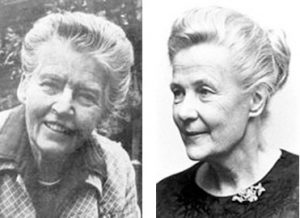Read our declaration from the 66th OMEP World Assembly and Conference.
OMEP responds to consultation on Ofsted.
After World War II, a strong humanitarian concern led a small group of educators and others concerned for the welfare of young children to seek a way to engage others committed to these aims.
 In 1946 Lady Allen of Hurtwood (UK) and Alva Myrdal (Sweden), with others from France, Denmark, and Norway, presented their plan for the creation of a world organization. The UNESCO Assembly in Paris greeted the plan with warm support, and the founders invited representatives of 19 countries from 5 continents to a World Conference on Early Childhood Education in Prague in 1948.
In 1946 Lady Allen of Hurtwood (UK) and Alva Myrdal (Sweden), with others from France, Denmark, and Norway, presented their plan for the creation of a world organization. The UNESCO Assembly in Paris greeted the plan with warm support, and the founders invited representatives of 19 countries from 5 continents to a World Conference on Early Childhood Education in Prague in 1948.
At that Conference, OMEP was born and Alva Myrdal was elected its first World President. The new organization was recognized then, as it is now, as the principal mechanism to bring together people from all over the world, without any criteria other than an objective to share information and initiate actions to benefit young children everywhere.
The second World Assembly, in 1949, drew representatives from 33 countries, and the third, in 1950, was attended by observers from the major intergovernmental agencies with related interests: UNESCO, UNICEF, and WHO.
Since then, triennial World Assemblies of OMEP have been held in: Mexico City, 1952; Copenhagen, 1954; Athens, 1956; Brussels, 1958; Zagreb, 1960; London, 1962; Stockholm, 1964; Paris, 1966; Washington, DC, 1968; Bonn, 1971; Caracas, 1974; Warsaw, 1977; Quebec, 1980; Geneva, 1983; Jerusalem, 1986; London, 1989; Flagstaff, Arizona 1992; Yokohama, 1995; and Copenhagen, 1998, Santiago, Chile in 2001, Melbourne, Australia, 2004, Havana, Cuba 2005, Tromso, Norway 2006, Mexico City, Mexico 2007, Quebec, Canada 2008, Lagos, Nigeria 2009, Gothenburg, Sweden 2010, Hong Kong 2011, Brazil 2012, Shanghai 2013, Cork 2014 and USA 2015.